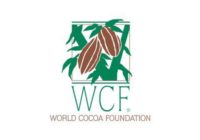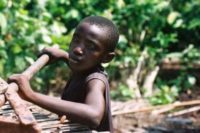Jacobs Foundation donates $52M to help West African cocoa farmers
Foundation hopes to ‘Transform Education in Cocoa Communities”

In an effort to improve the living conditions of cocoa farmers and their families, it’s launching the TRECC program. TRECC, which stands for “TRansforming Education in Cocoa Communities”, is a comprehensive, systemic approach to achieving sustainable social and economic change in the region. TRECC is a Clinton Global Initiative (CGI) Commitment to Action.
Ivory Coast is by far the world’s largest producer of cocoa, accounting for nearly 40 percent of global production. The country is experiencing continuing economic growth, yet poverty and a lack of education are pervasive problems.
Approximately 8 million Ivorians depend on cocoa farming, an industry dominated by smallholders, for their livelihoods. There are about 800,000 cocoa farmers, most of whom are illiterate and subsist on less than half a US dollar per day — substantially below the poverty line of two dollars per day.
In rural areas, 45 percent of 6- to 12-year-olds are not enrolled in school. Among 15- to 24-year-olds, roughly two-thirds (63 percent) have not completed primary school, and one youth in three has never attended school at all. Of children between the ages of 5 and 15, 1.4 million are working, half of them in agriculture.
Years of experience in Africa
The Jacobs Foundation has been working for six years to address these problems through its Livelihoods program.
In cooperation with the private sector, the program helps smallholders increase their productivity and boost their earnings through optimized cultivation methods — thereby improving the income and living conditions of the entire family.
This is seen as a vital condition to ensure the main aim of the Foundation in Africa, namely access to quality education. To that end, the Foundation cooperates with local authorities to improve access to public education and the quality of that education. The Foundation also hopes to integrate young people into the labor market and develop and strengthen local structures and skills.
“Our experience has taught us that education for a country’s poorest can only be successful if the necessary conditions are in place within the family, at work and in society. It is also important to note that sustainable development cannot be achieved without education. We have therefore decided to take our activities in Africa to the next level with the TRECC program, in an effort to promote sustainable social and economic change in the region,” explains Lavinia Jacobs, chair of the Jacobs Foundation.
Making use of synergies: TRECC and CocoaAction
With TRECC, the Jacobs Foundation is entering into a strategic partnership with the industry-wide platform CocoaAction.
CocoaAction, which is coordinated by the World Cocoa Foundation (WCF), was created by the 11 leading companies in the cocoa industry to improve the living conditions of cocoa farmers, thus also securing the long-term production of cocoa.
Through CocoaAction, these companies have undertaken to ensure access to training, better crop plants and fertilizer for some 300,000 cocoa farmers in Ivory Coast and Ghana by the year 2020. Efforts are also being made to strengthen these farmers’ communities by promoting education, supporting women and protecting children.
For the Jacobs Foundation, CocoaAction represents a viable, long-term basis for the Foundation’s educational program TRECC. Based on its experience, the Foundation is hopeful that this private-public partnership will produce comprehensive, systemic change for the long-term benefit of the entire region — particularly children and youth.
TRECC builds on six interconnected areas for action:
- Conducting research
- Capacity building of local organizations
- Funding educational projects in cooperation with members of CocoaAction
- Taking advantage of innovative financial instruments
- Activating additional partners
- Strengthening local education policy
(Detailed information on these areas can be found in Jacobs Foundation’s online fact sheet).
The program will run from June 2015 until the end of 2022. The Jacobs Foundation is allocating CHF 50 million for this purpose. Significant additional financial support will also come from co-investments by other partners in the private sector.
By 2022 the goal is for TRECC to improve the living conditions of 200,000 children and young people and 10,000 women.
The long-range objective is to ensure that rural communities have permanent access to high-quality education, even after the involvement of the Jacobs Foundation has come to an end.
“The World Cocoa Foundation is delighted to collaborate with the Jacobs Foundation through CocoaAction to directly benefit the education of 200,000 children in cocoa-growing communities in Côte d’Ivoire,” saysBarry Parkin, chairman, World Cocoa Foundation, and chief sustainability officer and health & wellness officer, Mars, Inc.
The Jacobs Foundation is active worldwide in promoting child and youth development. It was founded in Zurich, Switzerland, by entrepreneur Klaus J. Jacobs in 1989. The Jacobs Foundation allocates a budget of approximately 40 million Swiss francs per year to fund research projects, intervention programs and scientific institutions. It is committed to scientific excellence and evidence-based research.
Looking for a reprint of this article?
From high-res PDFs to custom plaques, order your copy today!






